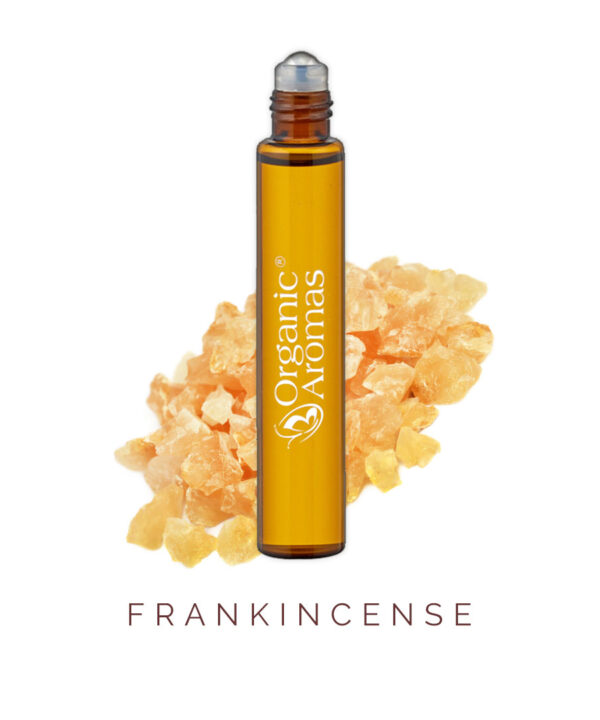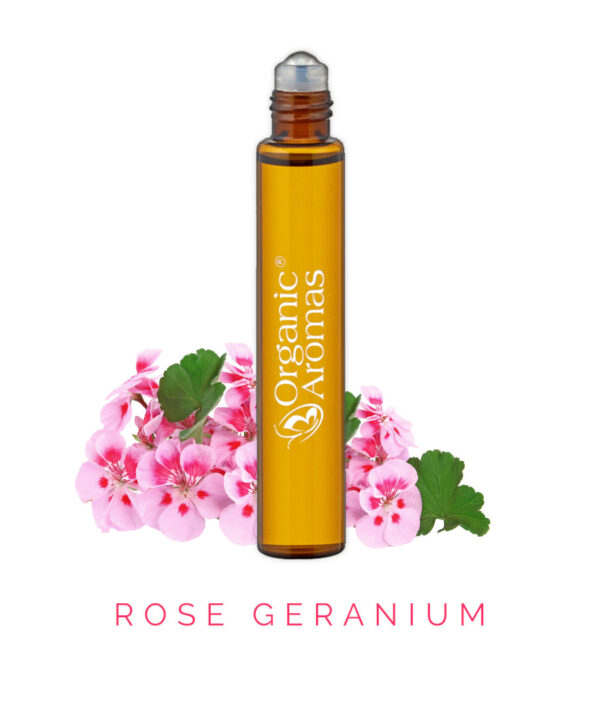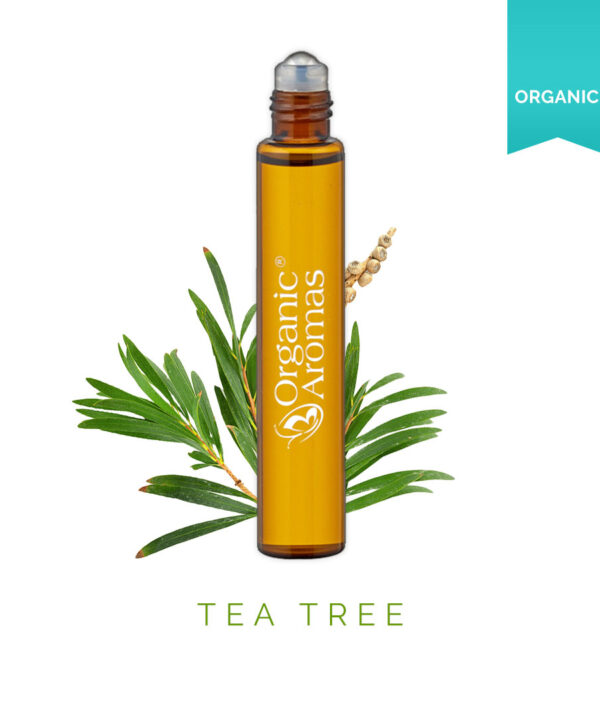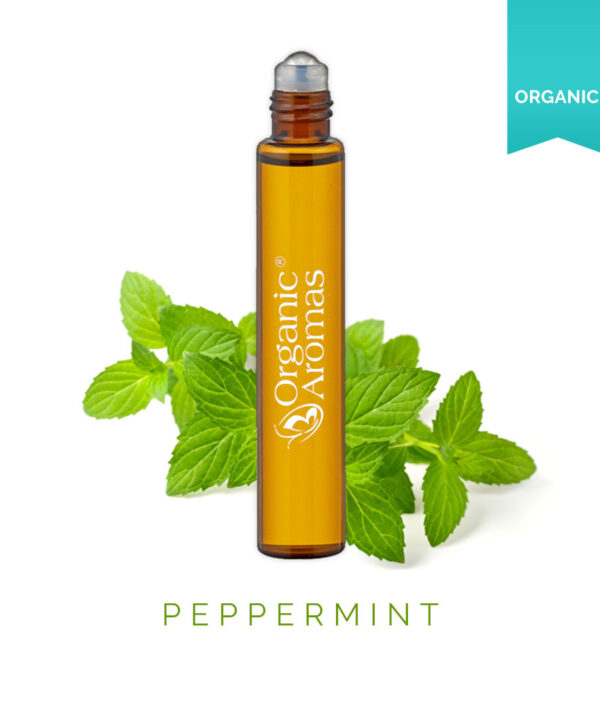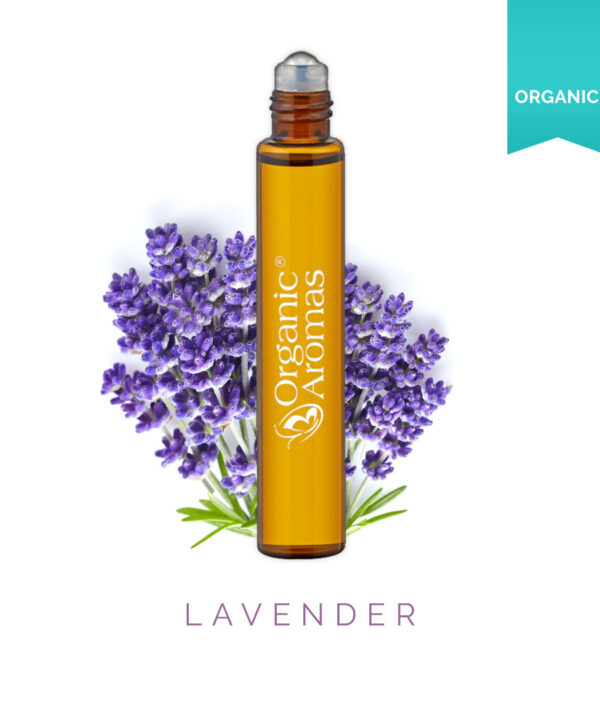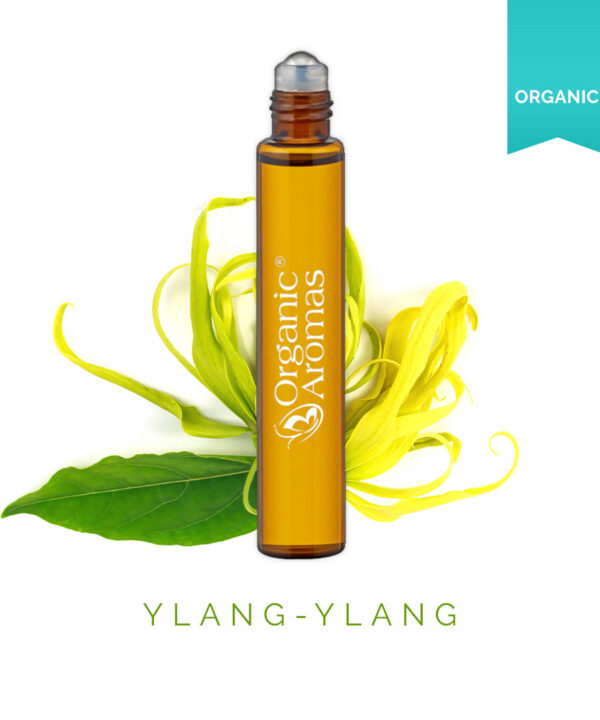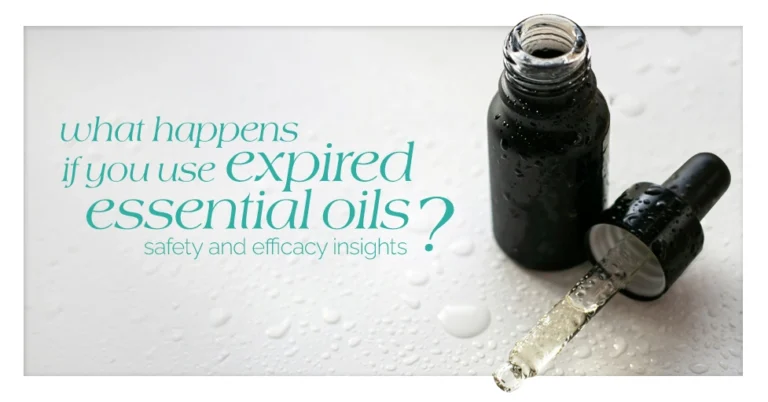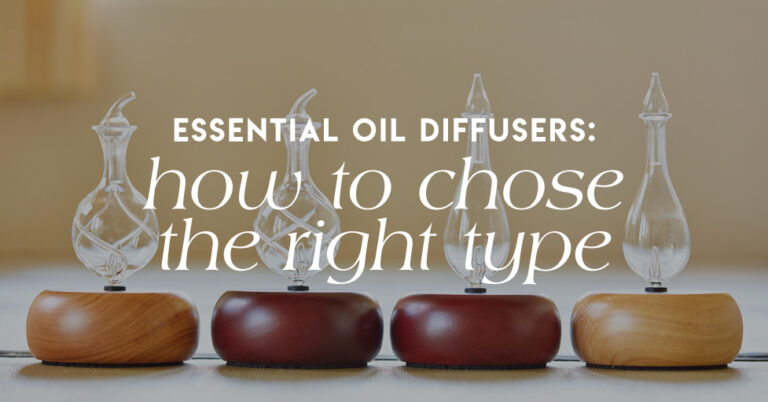Top Essential Oils for Poison Ivy Relief: Soothe Your Skin Naturally
Seeking relief from poison ivy’s relentless itch and irritation? This article dives into how essential oils for poison ivy might be the natural allies you need. You’ll discover which oils have properties that can soothe your inflamed skin and how to apply them for the best results, without any added fluff.
Want to Use Essential Oils for Poison Ivy? Here’s what you need to know…
- Essential oils such as tea tree, lavender, and peppermint have anti-inflammatory and other skin-healing properties that can provide relief from poison ivy symptoms.
- Home remedies using essential oils, like herbal infusion sprays, soothing oil blends, and healing clay pastes, offer practical ways to alleviate symptoms of poison ivy.
- Safety is paramount when using essential oils for skin care; they must be diluted with carrier oils, kept away from sensitive areas, and one should perform a patch test to prevent adverse reactions.
Understanding Poison Ivy and Its Effects on Skin
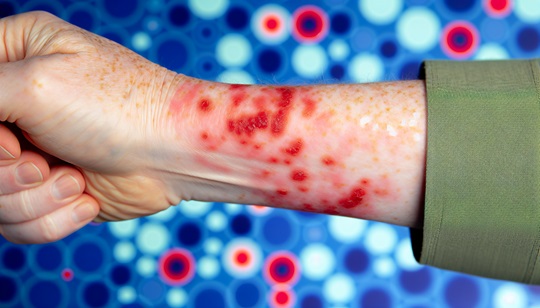
Poison ivy and poison oak, seemingly innocent plants, are notorious for their skin-irritating properties. The culprit is urushiol, an oil found in the plants’ flowers, leaves, roots, and stems. This oil triggers an allergic reaction, leading to symptoms such as itchy skin, inflammation, and blisters.
Often, the first encounter with poison ivy leads to sensitization, and an allergic reaction typically follows 24 to 72 hours after exposure. The manifestation of this reaction, known as contact dermatitis, can be identified by symptoms like:
Top Essential Oils to Combat Poison Ivy Symptoms
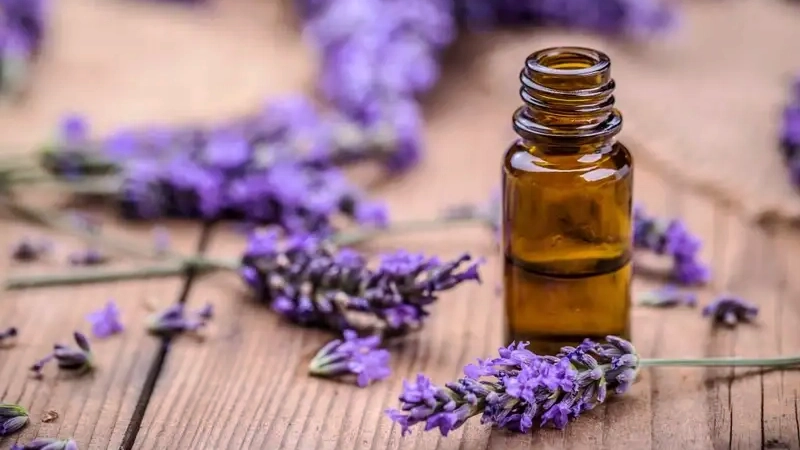
Having acquainted ourselves with the foe, let us now enlist the aid of our natural allies. Essential oils such as tea tree, lavender, and even peppermint essential oil are our front-line soldiers in this fight. All three oils boast anti-inflammatory and skin-healing properties, making them ideal candidates for poison ivy relief.
Tea Tree Essential Oil: Nature’s Antiseptic
Among the warriors in our arsenal, tea tree oil stands out with its potent anti-inflammatory properties, offering relief from the inflammation associated with poison ivy rashes. This nature’s antiseptic also carries antimicrobial properties, protecting your skin from further infection during the healing process.
Despite its noted efficacy in alleviating poison ivy symptoms, one must exercise caution with tea tree oil. Some individuals may experience sensitivity to this oil, so remember to always conduct a patch test before fully integrating it into your routine.
Watchout for Poison Ivy on Hiking Trails
Lavender Oil: The Soothing Scent
We also have lavender oil, a formidable co-ally in our pursuit of relief from poison ivy. Known for its calming scent, lavender oil is more than just a pleasant aroma. It packs anti-inflammatory and analgesic properties, making it a formidable opponent against the discomfort caused by poison ivy rashes.
Lavender essential oil has many benefits for skin health, including:
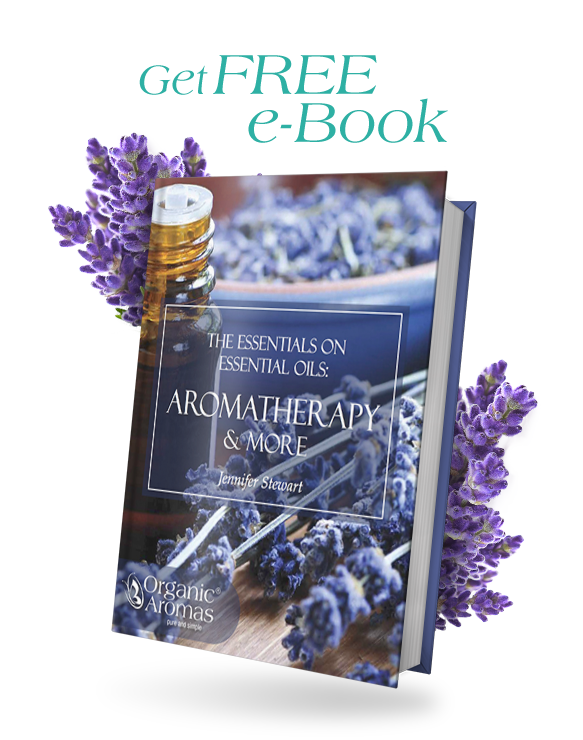
Sign Up to Get Your FREE
e-Book Here…
Peppermint Oil: Cool Relief for Itchy Skin
Additionally, peppermint oil, essential yet often overlooked, comes into play. Famous for its cool relief, peppermint oil is a breath of fresh air for your itchy skin. It’s analgesic and anti-inflammatory properties provide comfort for those dealing with poison ivy rashes.
The secret lies in the menthol in peppermint oil, which triggers cold-sensitive receptors in the skin. This induces a cooling sensation, relieving the redness and itchiness resulting from poison ivy.
Eucalyptus Oil: The Shield Against Inflammation
Eucalyptus oil emerges as a guardian in our natural remedy toolkit, particularly for combating poison ivy’s irritations. It is distinguished by its 1,8-cineole content, a compound known for its dual action: quelling inflammation and warding off bacteria. This makes eucalyptus oil not just a shield against the fiery wrath of poison ivy rashes but also a defender against potential skin infections.
Frankincense Oil: The Calmer of Redness
In the realm of natural soothers, frankincense oil claims its throne with grace. Famed for alpha-pinene, it’s a master in diminishing redness and swelling, traits essential in the battle against poison ivy. Its astringent nature further aids in gently drying blisters, providing a two-fold approach to discomfort: easing inflammation and promoting the wound healing process.
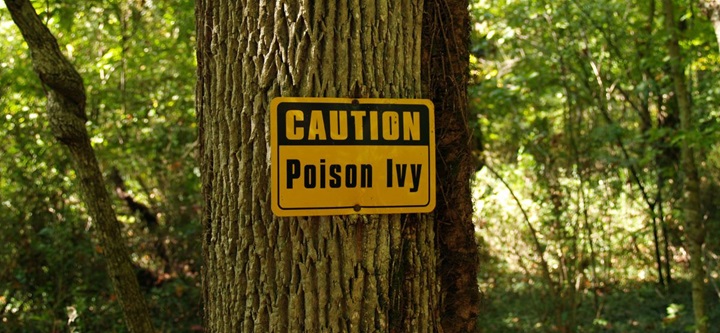
Geranium Oil: The Balancer of Skin
Geranium oil, with its unique blend of citronellol and geraniol, emerges as a harmonizer of skin’s natural state. It excels in soothing itchy, aggravated skin, a common plight with poison ivy. By restoring balance and offering a gentle touch of relief, geranium oil becomes both an analgesic and indispensable ally in soothing the skin’s turmoil caused by poison ivy encounters.
Chamomile Oil: The Gentle Healer
Chamomile oil, a gentle yet powerful ally, emerges as a key player in soothing poison ivy’s wrath. Revered for its bisabolol content, this oil is a natural healer, adept at reducing inflammation and calming irritated skin. Its soothing properties make it a go-to remedy for the itching and discomfort that often accompany poison ivy rashes. Chamomile oil stands as a testament to nature’s ability to provide gentle, effective relief in the face of skin adversities.
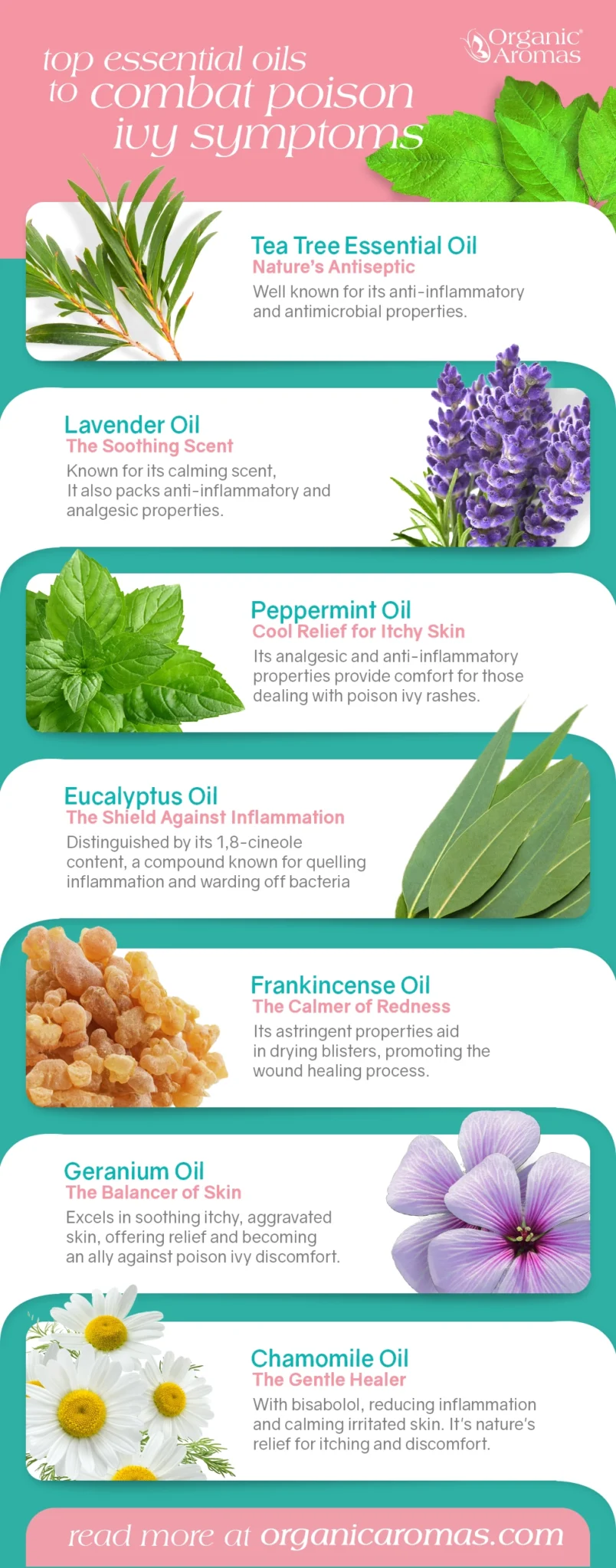
The Following Table Shows What Essential Oils for Poison Ivy are Really Doing…
| Essential Oil | Component | Properties | Benefits |
|---|---|---|---|
| Chamomile Oil | Bisabolol | Soothing, anti-inflammatory | Calms skin, reduces inflammation |
| Lavender Oil | Linalool | Calming, Anti-inflammatory | Eases discomfort, soothes skin |
| Eucalyptus Oil | 1,8-cineole | Anti-inflammatory, Analgesic | Soothes irritated skin, reduces pain |
| Geranium Oil | Citronellol, Geraniol | Balancing, Soothing | Balances skin oils, relieves itching |
| Tea Tree Oil | Terpinen-4-ol | Antibacterial | Prevents infections in affected areas |
| Frankincense Oil | Alpha-pinene | Antibacterial | Useful in preventing skin irritations |
| Lemon Oil | Limonene | Astringent | Aids in drying of blisters |
| Rosemary Oil | Cineole | Astringent | Tightens and tones the skin |
Crafting Your Own Poison Ivy Remedies at Home
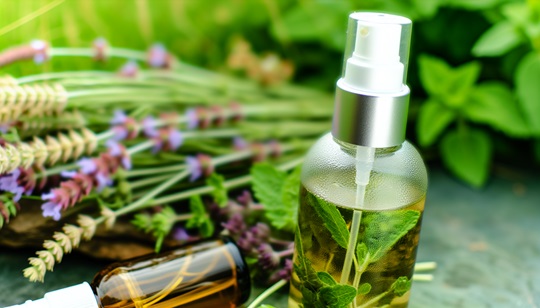
Having identified our natural allies, it’s time to innovate and concoct some home remedies. From herbal infusion sprays to soothing oil blends and healing clay pastes, there’s a myriad of ways we can harness the power of essential oils to combat painful rashes and symptoms of poison ivy.
Herbal Infusion Spray
One of the easiest and most effective ways to utilize essential oils for poison ivy relief is through a herbal infusion spray. This can be crafted by:
This potent spray can be applied directly to a poison ivy rash or areas exposed to the plant. It helps dry out the rash and alleviate irritation, offering relief with every spritz.
Soothing Oil Blend
Sometimes, simplicity is key. A soothing oil blend can be crafted by simply mixing coconut oil with poison ivy essential oils like peppermint and rose geranium oils. This blend, when applied to the affected area, provides a cooling sensation and relieves pain, offering a gentle yet effective relief from inflamed rashes.
The beauty of this blend lies in its versatility. It can be used as a daily preventive measure or as a remedy during an outbreak, making it a valuable addition to your skincare routine, particularly for pregnant women looking for natural treatments.
Healing Clay Paste
Another effective home remedy for poison ivy relief is a healing clay paste. This can be made by mixing bentonite clay with raw apple cider vinegar until it reaches the consistency of Greek yogurt. For added relief, hydrocortisone cream or calamine lotion can be incorporated into the paste to help alleviate itching and irritation.
The healing clay paste can be applied in a thin layer to the affected area, and left to dry for about 20 minutes or until it flakes off naturally. This treatment offers toxin removal and supports the healing process, making it an essential part of your poison ivy arsenal.
Alternative Supportive Treatments for Poison Ivy
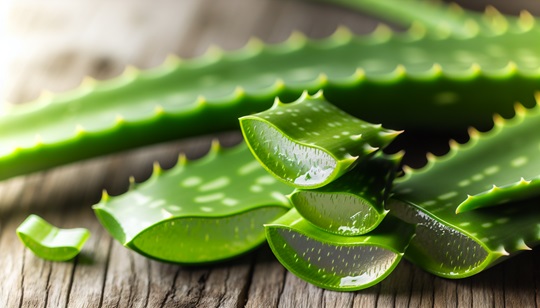
Though essential oils are vital in providing poison ivy relief, complementary treatments deserve recognition too. Let’s explore alternatives such as:
These treatments can further enhance our journey towards relief as we treat poison ivy.

Join Our Exclusive Member Club to get Big Discounts!
Aloe Vera Gel: The Natural Soother
Aloe vera gel, a staple in many households, can prove to be a powerful ally in combatting poison ivy. Its soothing and cooling properties can help alleviate discomfort from poison ivy rashes. When dealing with skin irritation from poison ivy, aloe vera gel provides necessary moisture to the affected skin area, aiding in the relief process.
Even though aloe vera gel provides comfort and relief for skin conditions, one must understand that no conclusive evidence exists to prove aloe vera gel can expedite the healing of poison ivy rashes. It’s always beneficial to combine aloe vera gel with certain essential oils for enhanced benefits.
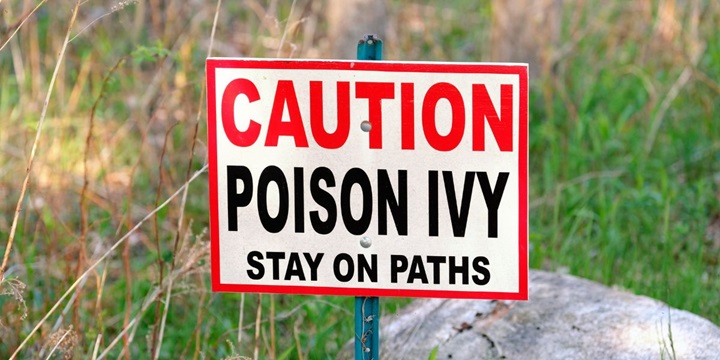
Oatmeal Baths: Gentle and Effective
Oatmeal baths are another gentle and effective alternative for poison ivy relief. This age-old remedy involves grinding regular oats finely or using colloidal oatmeal, filling a tub with warm water, and soaking in the mixture for at least 15 minutes.
For added therapeutic benefits, consider adding a few drops of essential oils like peppermint or lavender to the warm oatmeal bath. These oils will not only further soothe inflammation on the skin but also:
This helps to make your bath a holistic healing experience!
Safety Precautions When Using Essential Oils for Poison Ivy
Despite the plethora of benefits essential oils provide, their usage demands careful handling and caution. Here are some guidelines to follow:
By following these guidelines, you can safely enjoy the benefits of essential oils.
Always store essential oils safely out of reach of children and discard them after 3 years or if there is a change in appearance, texture, or smell.
Integrating Essential Oils into Your Skincare Routine

With knowledge and remedies in our arsenal, it’s time to assimilate the best essential oils into our skincare regimen. Choosing pure, high-quality essential oil is key to ensuring the safety and efficacy of your self-care regime. For those with sensitive skin, opting for gentle essential oils such as:
Using products designed for sensitive skin types can significantly reduce the risk of irritated skin and irritation.
Incorporating essential oils into your daily skincare routine can not only help mitigate the severity of poison ivy and allergic reactions, but also enhance overall skin health. A homemade lotion made with shea butter, coconut oil, and skin-soothing essential oils like lavender or chamomile can help maintain healthy skin.
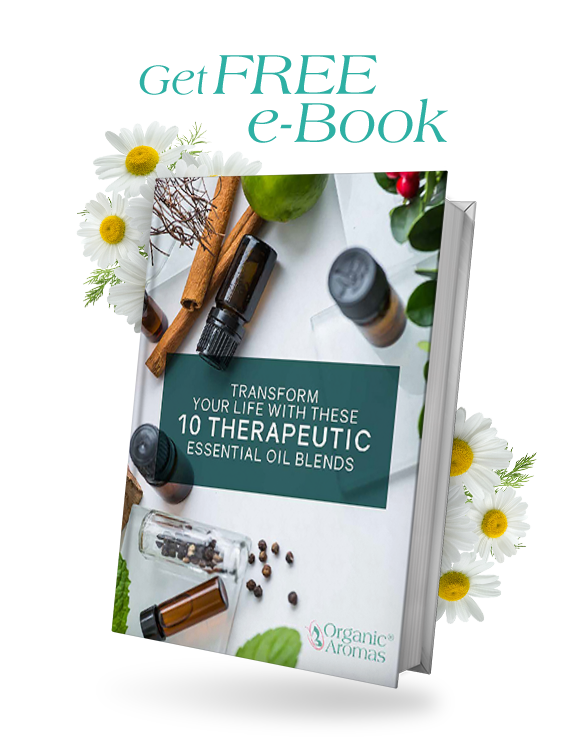
Sign Up to Get Your FREE Essential Oils e-Book Here
Final Words on Essential Oils for Poison Ivy
In conclusion, dealing with poison ivy is no longer a daunting task with the help of nature’s potent essential oils. From tea tree, lavender, and peppermint oils to homemade remedies and alternative treatments, we have an array of options at our disposal. Remember, the key to effective relief is understanding our symptoms, choosing the right oils, and using them safely. Here’s to embracing the power of nature and welcoming relief from poison ivy!
Frequently Asked Questions
What essential oils are best for poison ivy?
The best essential oils for treating poison ivy are lavender, peppermint, Roman chamomile, and tea tree oil. These can be mixed and applied to the affected area to soothe the rash.
What dries up poison ivy quickly?
You can quickly dry up poison ivy by applying aloe vera gel or a slurry of baking soda and water to the affected area. You could add an astringent like witch hazel or a little bit of essential oil like geranium. These remedies can soothe the skin and help speed up the healing process.
Are there any safety precautions I should follow when using essential oils for poison ivy?
Yes, when using essential oils for poison ivy, be sure to dilute them with a carrier oil, avoid sensitive areas, store them safely, and discontinue use if a skin reaction occurs.


